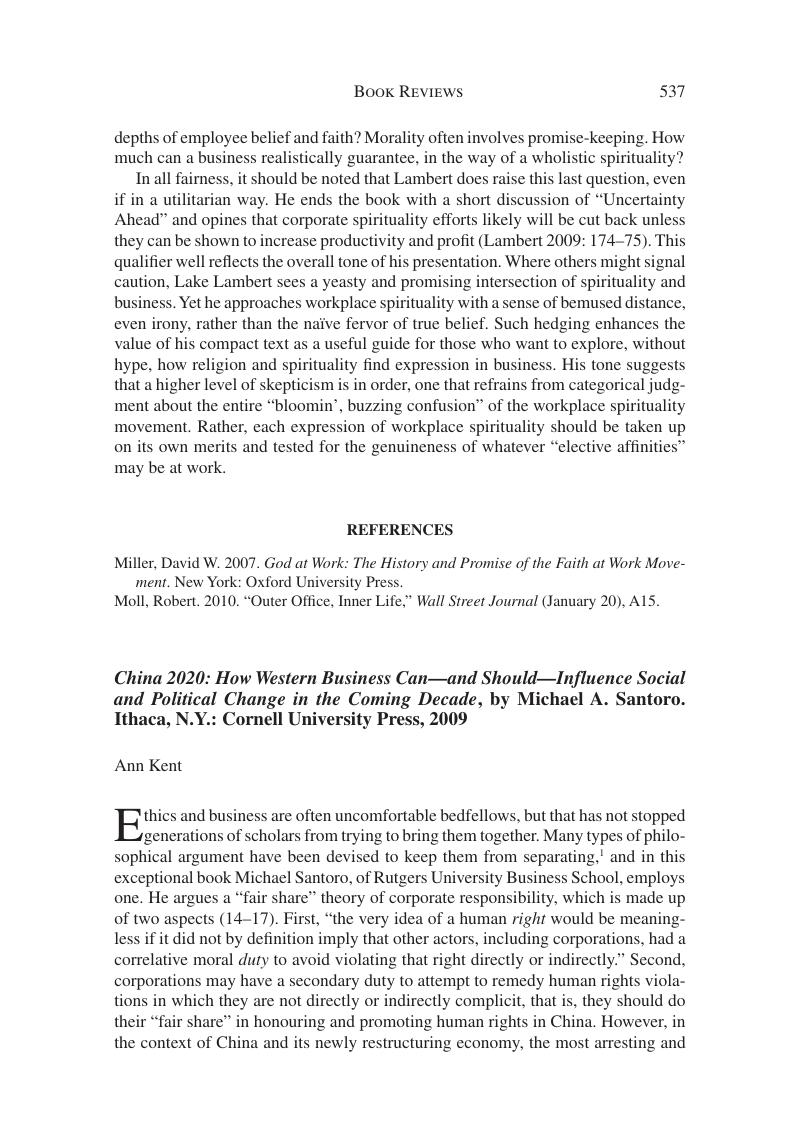No CrossRef data available.
Published online by Cambridge University Press: 23 January 2015

1. See, for instance, David Kinley, Civilising Globalisation: Human Rights and the Global Economy (Cambridge: Cambridge University Press, 2009); and Business Ethics Quarterly articles.
2. François Godement, “A Global China Policy,” European Council on Foreign Relations Policy Brief, 2010, at ecfr.eu, 1.
3. A recent New York Times blog sought the opinions of six experts on why Chinese workers are risking their safety by resorting to demonstrations, when freedom of association is not a right guaranteed under the Chinese constitution or any enabling legislation. None of these scholars gave this reason for the recent strikes. See “What do China’s Workers Want,” Room for Debate, Blog, New York Times, 13 June 2010, at http://roomfordebate.blogs.nytimes/2010/06/13.
However, precisely because the Chinese government does not support the right of freedom of association, and has refused to ratify the relevant ILO Conventions 87 and 98 which guarantee this right, it is clear that such high-profle demonstrations, flled with model workers in sparkling white uniforms, holding immaculate posters, must be receiving at least tacit government support. See Ann Kent, Beyond Compliance: China, International Organizations and Global Security (Stanford, Calif.: Stanford University Press, 2007 and 2010), 216–17. The other circumstantial evidence is that the demonstrations are all being held in foreign investment companies, and not in private Chinese companies, let alone Chinese state-owned enterprises (SOEs).
4. See Isabel Hilton, “Is Google Just the Start”? The Guardian, 13 July 2010, at http://www.guardian.co.uk.
5. Michael Wines, “Geologist’s Sentence is Questioned,” New York Times, 5 July 2010.
6. Anthony Faiola, “China Buys up ‘Bargain-Basement’ Greece and Extends its Global Reach,” The Guardian Weekly, 18 June 2010, p. 9. When the Chinese shipping giant Cosco assumed full control of the major container dock in Piraeus, its chief executive stated: “We have a saying in China, ‘Construct the eagle’s nest, and the eagle himself will come.’ We have constructed such a nest in your country to attract such Chinese eagles.” China has even come into confict with the IMF over its activities abroad. Hence, the confict over a controversial $9 billion Chinese development plan in the Democratic Republic of Congo, which in the view of the IMF, would add to its $11 billion sovereign debt load and present obstacles to ongoing discussions to settle this debt. See Nina Hachigan et al, China’s New Engagement in the International System: In the Ring but Punching below its Weight, Center for American Progress, November 2009, at http://www.AmericanProgress.org.
7. US government statements on behalf of Google when it was objecting to Chinese government censorship are one refection of the realisation by states that what foreign businesses are allowed, or required, to do inside China may well in time affect the interests of the home state. See Mark Landler, “Clinton Urges Global Response to Internet Attacks,” New York Times, 21 January 2010.
8. BBC, “The Monday Documentary—China: Shaking the World,” series reported by Michael Robinson, BBC World Service, 12–18 July 2010.
9. John Fox and Francois Godement, “A Power Audit of EU-China Relations.” European Council on Foreign Relations Policy Report, April 2009, at http://www.ecfr.eu, p.19.
10. Christopher Michaelson, “Revisiting the Global Business Ethics Question,” Business Ethics Quarterly 20(2) (April 2010): 237–51.
11. “Debt Hostages: How Not to Become One,” 2 May 2010, reproducing post by Dan, “How Not to Get Kidnapped in China,” 1 May, China Law Blog (Harris and Moure), in Chinese Law Prof Blog at http://lawprofessors.typepad.com/china_law_prof_blog/2010/05/debt-hostages-how-no.
12. EUbusiness, “China Again Heads EU’s Dangerous Products List,” 2010 EUbusiness Ltd, at http://www.eubusiness.com/news-eu/china-consumer.454.
13. The State Council Information Offce, China, China’s Efforts and Achievements in Promoting the Rule of Law, 2008 White Paper reprinted in Chinese Journal of International Law 7(2) (2008): 544.
14. Fox and Godement, “A Power Audit,” 12.